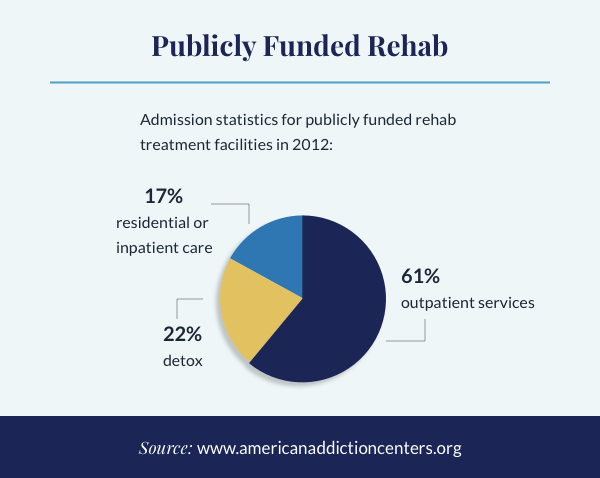Financing & Grants for Substance Abuse Treatment
Government Funding for Drug and Alcohol Rehabilitation
Many people in the United States would benefit from professional help for their substance abuse issues. However, the perceived cost of addiction rehab can keep some people from seeking out the treatment they need. It is completely normal to need help paying for drug rehab and, luckily, there are a variety of options that can help cover the cost of treatment. Insurance coverage and grants for rehab centers are just some of the options people have if they are struggling with substance abuse issues and need treatment. Some forms of financial assistance for substance abuse treatment include:
- State-funded substance abuse programs and state-funded detox addiction treatment programs.
- Substance Abuse and Mental Health Services Administration (SAMHSA) grants.
- Medicare and Medicaid.
- U.S. Department of Veterans Affairs.
- The Affordable Care Act (ACA).
For some people struggling with addiction to drugs or alcohol, the cost of treatment may discourage them, or their friends or family, from seeking help.
Many treatment programs—especially inpatient programs—are simply cost-prohibitive for a large number of people. As a result, many people who may need help with substance abuse issues and addiction put off treatment, which means that those people may decide to not get help at all. At American Addiction Centers, we partner with many insurance providers to cover many treatment costs.
To make sure that treatment is attainable when it is needed, there are public assistance options that can offer these people the financial support they need to begin the recovery process. These options range from government grants to state-funded rehabilitation centers.
What’s the Cost of Addiction Treatment?
The cost of treatment programs ranges widely, based on factors that include:
- Whether the person receives inpatient or outpatient treatment.
- How long the person stays in the program.
- Whether the provider is a government-funded clinic, hospital program, or private treatment center.
- Whether there is a dual diagnosis (co-occurring mental health disorder) or other condition involved in treatment.
- The level of luxury provided in a substance abuse center setting (e.g., amenities such as spa treatments, horseback riding, private rooms).
- Where the facility is located (highly desirable settings such as near the beach will significantly add to the cost).
These costs can range anywhere from a few hundred dollars for minimal intervention to more than the cost of a car for high-end, luxury inpatient rehab centers. Unfortunately, some people’s severity of addiction and related issues might require more intensive levels of treatment.
Even a few hundred dollars can be prohibitive for some people—and that’s where public funding can take up the slack and get individuals the help they need when they’re ready for it and most likely to benefit from it.
The Benefits of Funding & Grants For Substance Abuse Treatment Programs
Grants for substance abuse treatment prove highly effective not just for individuals, but for society as a whole. Research has shown that every dollar invested in a substance abuse center saves $4 in healthcare costs and $7 in law enforcement and criminal justice costs. Substance abuse treatment costs an average of $1,583 per person and is associated with a cost offset of $11,487—a greater than 7:1 benefit-cost ratio.1
Further, a study in California found that substance abuse treatment for 60 days or more can save more than $8,200 in healthcare and productivity costs. And a study in Washington state found that offering a full addiction treatment benefit led to per-patient savings of $398 per month in Medicaid spending.1
These kinds of numbers make it very attractive for states and municipalities—and for the nation as a whole—to invest in drug and alcohol rehab programs.
Treatment saves government resources and taxpayer money, and it results in more effective recovery; therefore, there have been a number of methods established to provide public assistance for drug and alcohol addiction prevention, treatment, and rehab.
State and Local Government Assistance
According to research from the Pew Charitable Trusts, the majority of U.S. spending on alcohol and drug treatment—nearly a third of the total U.S. cost—comes from state governments and local municipalities.2
Some of this public assistance comes through an individual state’s substance abuse agency; in several states, this agency is included under a larger municipal health or behavioral health department. These agencies develop and implement their state’s addiction prevention and treatment programs, and manage the state, federal, and other funds that are allotted to substance abuse.2
However, these agencies do not account for the majority of money spent by states and local governments on substance abuse programs.2
Child protective services, corrections systems, drug courts, and other smaller agencies are the major users of state and local funding for drug and alcohol treatment programs.2
What is State-Funded Drug Rehab?
Through federal and state financing, states are able to set up and provide free substance abuse help through their own rehab centers. There are various types of rehabilitation options for substance abuse available for those looking for state-funded drug rehab. State centers can provide both inpatient and outpatient treatment, and they can offer follow-up support services or refer people to them.
These programs may not offer many amenities or the most up-to-date treatment methods. And while they may offer inpatient care, a large portion of their care is detox or outpatient. In 2012, 61% of admissions at publicly funded treatment centers were for outpatient services, 22% were for detox, and 17% were for residential or inpatient care.2

Further, state-funded centers often have specific requirements in order for an individual to be accepted into the program. These vary by state but may include:
- Proof of residence in the funding state.
- Demonstrated inability to afford other treatment (based on low or no income, lack of insurance, etc.)
- Proof of citizenship or legal residence in the U.S.
- Information about the degree or level of addiction and history.
A challenge with these treatment centers is that there can be a waiting list to get into them. Often, certain people are given priority for spaces, such as pregnant women or veterans.
But the waiting lists should not deter people from seeking help at these programs. They may not be as glamorous as the luxury rehab centers you see on TV, but they still help people get sober every day. Getting some form of treatment is better than no help at all.
According to SAMHSA, in 2016, almost 1.7 million people age 12 and older were admitted to publicly funded rehab centers. The top substances people sought treatment for included opiates (579,528), alcohol (552,990), and marijuana (228,391).3
Government Substance Abuse Programs Assistance
Federal support for drug treatment centers and other programs is also provided through a number of means. The U.S. government agency that offers much of this support is the Substance Abuse and Mental Health Services Administration. SAMHSA provides information, services, and grants aimed at helping rehab centers and substance abuse programs provide much-needed services to those who need them but can’t necessarily afford them.
Other public assistance from the federal government includes programs such as Medicare and Medicaid, Veterans Affairs (VA) benefits, and provisions under the Affordable Care Act (ACA). Most of these programs require some level of eligibility based on income, age, disability, or other social indicators.
SAMHSA Grants for Substance Abuse Treatment
What are the SAMSHA grants? SAMHSA grants are a noncompetitive, federal source of funding for state drug and alcohol rehabilitation programs. Known as block grants, and described on the SAMHSA website, these grants are mandated by Congress to help fund substance abuse and mental health services. Specifically, the Substance Abuse Prevention and Treatment Block Grant program provides funds and technical assistance to states.4
Some SAMHSA grants can provide care to specific segments of the population, such as the Services Grant Program for Residential Treatment for Pregnant and Postpartum Women.5 Other targeted populations include IV drug users, people with tuberculosis, and people at risk for HIV/AIDS.6 The funds may also be used to cover treatment and support services for people who don’t have insurance.4
Veterans Administration Drug Abuse Help
The U.S. Department of Veterans Affairs provides coverage for substance abuse treatment for eligible veterans through the VA. According to the VA website, financial help for recovering addicts who served in the armed forces may include:11
- Screening for alcohol or tobacco use.
- Short-term outpatient counseling to build motivation to change.
- Intensive outpatient treatment.
- Residential care.
- Medically managed detox and follow-up support.
- Counseling services for couples.
- Aftercare and relapse prevention.
- Self-help groups.
- Medications to help manage withdrawal and reduce craving, such as methadone or buprenorphine for opioid addiction.
Decisions about services are made based on the veteran’s needs and wishes. For more information, talk to your VA healthcare provider, contact your local Vet Center, or call the VA’s general hotline at 1-800-827-1000.
Substance Abuse Treatment Loans & Drug Rehab Financing
There are a number of loan options for drug rehab including: personal loans, bank loans, and using a credit card. Finding the best option that works for your case depends on a variety of factors so if you have questions about your options, contact us at You may also fill in our financing interest form below and an advisor may contact you to help you through the financing process.
Finding Funding for Addiction Treatment
Cost does not have to be an impediment to treating addiction to drugs or alcohol. As demonstrated above, there are many ways to get public assistance for substance abuse treatment and recovery. Specific treatment centers and public programs are available to help individuals who are struggling with addiction, or for their families, to find the help they want and need to move forward to recovery. All that is required is knowledge of what is available and the willingness to pursue it. If a person is ready for treatment, these options are available, regardless of the individual’s ability to pay.
Find Local Addiction Treatment Facilities Near Me
Sources
- White House Office of National Drug Control Policy. (2012). Cost Benefits of Investing Early in Substance Abuse Treatment.
- Pew Charitable Trusts. (2015). Substance Use Disorders and the Role of the States.
- Substance Abuse and Mental Health Services Administration. (2018). Treatment Episode Data Set (TEDS) 2016.
- Substance Abuse and Mental Health Services Administration. (2019). Substance Abuse and Mental Health Block Grants.
- Substance Abuse and Mental Health Services Administration. (2019). Services Grant Program for Residential Treatment for Pregnant and Postpartum Women.
- Substance Abuse and Mental Health Services Administration. (2017). Substance Abuse Prevention and Treatment Block Grant.
- Medicare Interactive. Treatment for alcoholism and substance use disorder.
- Centers for Medicare & Medicaid Services. (2016). Medicare Coverage of Substance Abuse Services.
- Centers for Medicare & Medicaid Services. (2014). Coverage and Delivery of Adult Substance Abuse Services in Medicaid Managed Care.
- Healthcare.gov. Medicaid & CHIP coverage.
- U.S. Department of Veterans Affairs. (2015). Treatment Programs for Substance Use Problems.
- Healthcare.gov. Mental health & substance abuse coverage.
- Henry J. Kaiser Family Foundation. (2018). Explaining Health Care Reform: Questions About Health Insurance Subsidies.

